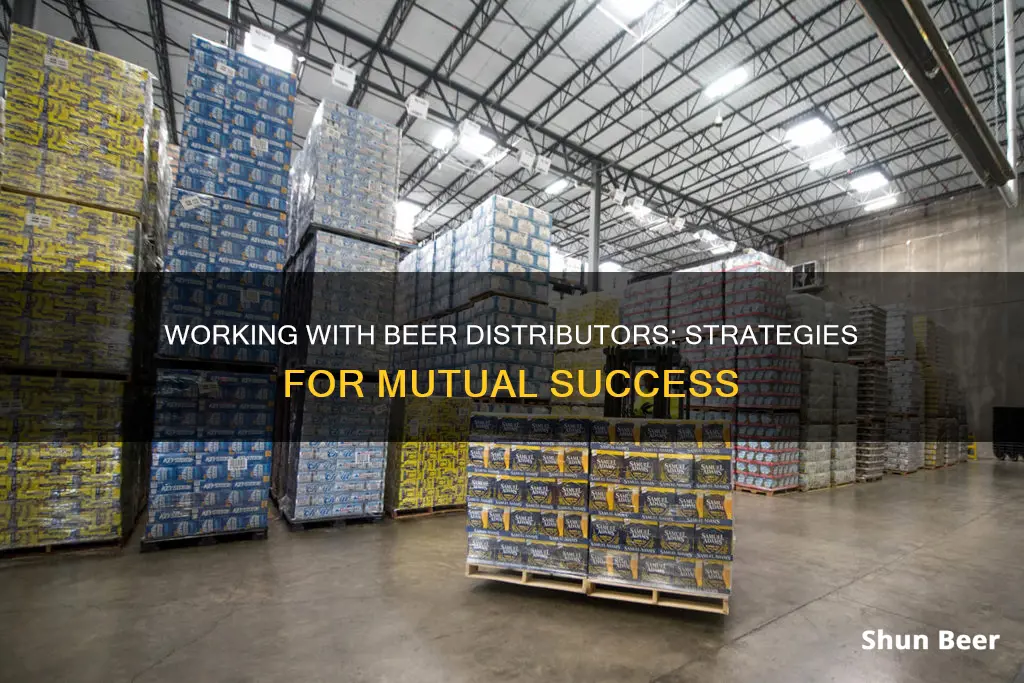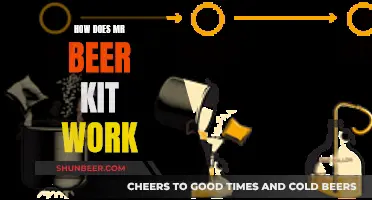
Beer distributors are licensed, independent intermediaries that play a crucial role in the alcohol supply chain. They purchase beer from breweries and sell and transport it to retailers, including restaurants, bars, and stores. Distributors are essential for breweries to increase their sales and market reach, acting as an additional marketing channel. Distributors also handle the challenging logistics of beer delivery, ensuring it is stored and transported under specific conditions. In the US, the three-tier distribution system separates producers, distributors, and retailers, with some states allowing self-distribution or a four-tier system. Distributors are highly regulated, especially for alcohol, and they also act as tax collectors for the supplier side. When working with distributors, it is important to build a strong relationship and understand the distribution landscape to set yourself up for success.
| Characteristics | Values |
|---|---|
| Role | Beer distributors are the middle tier of the three-tier system. They purchase beer products from breweries and distribute them to retailers. |
| Level | Beer distributors operate on an international, national, or statewide level. |
| Operations | Purchasing, inventory management, warehousing, delivery, sales, and marketing. |
| Benefits | Beer distributors help breweries increase their sales and reach more retailers and consumers. They also assist in marketing and promotion, and handle logistics, allowing breweries to focus on production. |
| Selection | Distributors offer a wide selection of breweries, including craft beers and international options. |
| Supply Chain | Distributors have established supply channels and can provide efficient delivery and administrative support. |
| Expertise | Distributors have knowledge of the beer industry, including seasonal offerings, market trends, and regulatory requirements. |
| Marketing Support | Distributors provide marketing materials, information about promotional events, and assistance with promoting a business's beer menu. |
| Regulatory Support | Distributors understand the regulations in different states and can help ensure compliance. |
| Pricing | Distributors purchase beer at a lower price from breweries and sell it at a higher price to retailers, with profit margins depending on cost, operational expenses, and pricing agreements. |
What You'll Learn

Understanding the three-tier distribution system
The three-tier distribution system is a regulatory framework that was established in the United States after the repeal of Prohibition. It governs the distribution of beverage alcohol by requiring a separation of the three tiers of the supply chain: producers, distributors, and retailers. This system is designed to prevent the consolidation of power in the industry and ensure a level playing field for all players.
The three tiers explained:
Tier 1: Producers/Manufacturers
The first tier in the three-tier system involves all producers, including brewers, distillers, vintners, and importers of foreign alcoholic beverages. At this level, the products are manufactured and then sold to a distributor, generally at a 50% price increase.
Tier 2: Distributors/Wholesalers
Distributors are the middle tier in the three-tier system. They are responsible for purchasing products from producers and selling them to licensed retailers. Distributors are licensed by individual states and must comply with state-specific regulations. They handle the logistics such as storage, transportation, and marketing of the products. Distributors should also offer a network of contacts and relationships with retailers that producers do not have.
Tier 3: Retailers
Retailers are the final tier in the three-tier system and include licensed locations like bottle shops, liquor stores, restaurants, and bars. They are responsible for selling beverage alcohol products directly to consumers and ensuring that alcoholic beverages are only sold to those of legal drinking age.
Pros and cons of the three-tier system:
The three-tier system provides "checks and balances" to ensure ethical sales practices and prevent sole ownership across production, distribution, and retail. It encourages competition and disallows distributors from having monopolies on popular products, resulting in a greater diversity of products for chefs and consumers.
However, the system has been criticised for facilitating massive markups, with consumers paying 150% (or more) markup per bottle due to the journey from producer to retailer. Additionally, small breweries, distilleries, and wineries may struggle to create business relationships with supplier groups and distributors, and funding a third business tier can drive up beverage costs.
State-by-state variations:
It's important to note that liquor regulations vary from state to state, and each state has its own set of laws governing alcohol distribution. These laws can impact the business relationships between suppliers, distributors, and retailers, as well as the availability of certain alcoholic products in specific states.
Wet Paper Towel on Beer: Does This Method Work?
You may want to see also

Choosing the right distributor
Choosing the right beer distributor is a crucial step in ensuring the success of your craft brewery. Here are some factors to consider when selecting a distributor:
Market Understanding and Planning:
Before approaching distributors, it is essential to have a clear understanding of the market. Study the specific marketplace you want to target. Evaluate if there is already a high presence of similar products and if your brand can offer something unique. This knowledge will help set reasonable expectations for both you and the distributor. Develop a well-defined market plan and set clear goals for sales and distribution. Distributors will appreciate your research and planning, making it easier to establish a successful partnership.
Distributor's Portfolio and Fit:
Examine the distributor's portfolio to assess if your brand can receive adequate attention and stand out among their other products. Consider if your brand will complement or differentiate their existing offerings. Look for distributors who have experience and a strong reputation in the beer industry, especially with craft beers. Evaluate their sales force and account servicing capabilities. A smaller distributor may offer more personalized attention, while a larger wholesaler may have a broader reach and more resources.
Alignment of Expectations and Values:
Be transparent about your expectations regarding sales, marketing, and support. Discuss the level of involvement you anticipate from the distributor and ensure that they are committed to promoting your brand. Choose a distributor that aligns with your core values and business practices. Evaluate their business ethics and labor practices to ensure they reflect positively on your brand. Remember that chemistry and a good personal connection with the distributor's team are also essential.
Product Quality and Packaging:
Distributors will assess the quality of your beer, so ensure it meets high standards. They may also consider the age of your brewery, with some requiring a minimum of two years in operation. Additionally, they will evaluate your packaging and market support. Invest in eye-catching and unique packaging design that can help your product stand out on retail shelves and tap handles.
Financial Considerations:
Understand the financial implications of working with a distributor. Distributors typically take a cut of around 25% to 30% of the gross profit. Ensure that your pricing strategy is realistic and allows for profitable returns. Discuss payment terms, margins, and any marketing allowances or financial obligations upfront to avoid misunderstandings.
Communication and Relationship Building:
Effective communication is vital when working with distributors. Be clear about your brand's story, unique selling points, and how you expect them to sell your products. Build relationships with the distributor's sales team and ensure they are knowledgeable and passionate about your beer. Remember that a good relationship with the distributor can turn into a long-lasting partnership, as James Stewart of Stewart Cellars highlights: "It's about making friends. These people that I've worked with over the years, they're my friends."
Do Sulfite Wands Really Work for Beer?
You may want to see also

Building a successful partnership
The relationship between a beer wholesaler and a supplier is like a marriage, so it's important to set expectations together. A beer distributor is there to break down a supplier's barriers to market entry. This often involves working with each retailer and assessing what makes sense for them to carry, providing good data for them around a product, and helping them to successfully build a product into their store.
On the supplier's side, a great partner is expected to be engaged with their distributor. This means picking up the phone and checking in, planning business together, walking through marketing strategies, and utilizing the wholesaler's resource teams. It also means having reviews to follow up and ensure plans are coming to fruition as expected.
A good tip is to use a "work-with" schedule, where suppliers have the opportunity to venture into the market to present that product with the sales team to retailers and customers. Not only does this educate the sales team, but it also creates a personal relationship between the supplier and retailer. This is incredibly valuable because the best suppliers are those that are engaged with their market and their wholesaler relationships.
Beyond engaging with a distributor so they can be effective stewards of the product to retailers, a supplier is responsible for the consumer side of brand building. As a supplier, you should know the answers to questions like:
- How do you plan to market your product and brand?
- What kind of digital presence will you have? What about events? Where else can you reach your target consumer?
- How will you drive people to the store to buy your product?
- Once a product has been placed with a retailer, how do you make sure consumers know that, or even care to seek it out?
Remember, passion for your dream is what got you into this industry, so sharing your story with the world should come as second nature. While the other aspects of creating a beverage may be a challenge, the good news is that you don’t have to do it alone. Take the time to educate yourself and find the right partners, and you’ll discover the flavor of success.
The Science Behind Fizzics Beer: How Does It Work?
You may want to see also

Regulatory compliance
At the federal level, the Alcohol and Tobacco Tax and Trade Bureau (TTB) within the United States Department of the Treasury sets standards and regulations for the beer industry. These regulations cover a range of topics, including labelling and advertising, exclusive outlets, commercial bribery, consignment sales, health warnings, and importation and exportation of beer.
State-level compliance is equally important in the beer distribution process. Each state has its own unique set of laws and regulations that govern the distribution and sale of beer. State-by-state regulations can vary significantly, and it is the responsibility of the brewer to understand and comply with the specific requirements of each state they sell in. This includes regulations related to what a brewer can supply to retailers and distributors, payment terms, and the often restrictive terms for terminating a distributor relationship.
To navigate this complex landscape of state-by-state regulations, brewers can benefit from using compliance software and services. These tools help automate compliance, reporting, and product registration, reducing the burden on brewers and distributors while ensuring adherence to the latest regulations.
Additionally, it is important to consider local laws and regulations, which can further impact the distribution process. For example, local laws may dictate whether a brewery can sell directly to customers or only to distributors, depending on their license and setup. Understanding these local nuances is essential for effective regulatory compliance.
By prioritizing regulatory compliance, brewers and distributors can ensure they are operating within the legal framework, mitigating risks, and maintaining a positive relationship with government agencies and consumers.
A Beer Kegerator's Working: Understanding the Basics
You may want to see also

Advantages of working with a distributor
There are several advantages to working with a beer distributor.
Firstly, distributors are experts in their field and have established supply channels. They can provide valuable knowledge of the market and important connections with retailers and restaurants, helping breweries reach a wider audience and create demand for their products. Distributors also handle the administrative aspects of the process, including automation, invoicing, ordering, and payments, saving breweries time and resources.
Secondly, distributors play a crucial role in marketing and promoting beer brands. They invest in sales and marketing efforts, building relationships with suppliers, retailers, and consumers, which is critical to the success of their business. Distributors also have established relationships with retailers, which can lead to better product displays, more shelf space, and promotions, ultimately driving sales for the brewery.
Thirdly, distributors handle the logistics of warehousing and delivering products to customers. They ensure that beer is stored under specific conditions, such as in temperature-controlled warehouses, and manage inventory with expiration dates in mind. Distributors also take on the responsibility of shipping, which can be challenging due to the unique characteristics of beer as a product.
Lastly, working with distributors allows breweries to focus on their core business. By outsourcing distribution, breweries can dedicate more time and resources to what they do best: creating innovative products, refining their brewing processes, and enhancing customer experiences.
While there are benefits to self-distribution, such as improved margins and greater control, working with distributors provides breweries with access to established networks, expertise, and operational efficiencies that can be challenging for small or growing breweries to achieve on their own.
The Intricacies of a Beer Exchange: Trading and Sampling
You may want to see also
Frequently asked questions
Beer distributors are intermediaries that help breweries transport their products to their clients, including restaurants, bars and stores. Distributors purchase beer from breweries, and then sell and transport it to retailers. Distributors are licensed by both federal and state governments.
Working with a beer distributor can be beneficial for businesses as it provides access to a wide selection of breweries, an established supply chain, efficiency in handling administrative tasks, and marketing support. Distributors also have the know-how, expertise and guidance on seasonal offerings, market trends and new releases.
Distributors might not be as concerned about quality control as breweries, and may not be able to provide customized or unique beers. Businesses might also get better pricing if they work directly with breweries and agree to large quantities.







